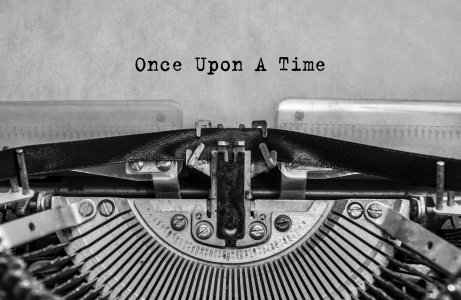Share your subject matter expert’s own experiences
When Thomas Reardon, M.D., president of the American Medical Association, spoke to the Federation of State Medical Boards of the United States, he used a personal story to make his key point:

In the end, he decided to end the treatment so his wife would have [a roof over her head once he was gone].
There has to be a better way. And the AMA is fighting to find that way, advocating on behalf of patients’ rights, advocating for meaningful Medicare reform, advocating for serious retooling of the health care system in its entirety. …
1. Find the desk-pounding moment.
Want to write a great brand story that builds emotional connections with your potential customers while revealing the truth about your brand?
Whether you’re writing a piece of content marketing, a social media post or a vision statement, you can reveal your brand personality and engage people with a compelling brand story.
What’s the secret to brand storytelling that shows people your product or service in a new light? Find the desk-pounding moment: Ask your subject matter expert when she realized the importance of the point you’re making — or when she saw the problem in action. That will help her recall events, encounters and other occurrences that can help you make the point.
Sometimes the best stories come from executives’ own experiences with the problem or situation. So take creative agency and make personal stories part of your brand story. Your target audience will love them, and your brand strategy will flourish.
2. Ask, ‘What’s your story?’
Warren Buffett, chairman of Berkshire Hathaway, uses this personal story in one of his letters to shareholders to illustrate the problem with executive spending:
So how do you get these stories?
When presentation trainer Lynn Espinoza was helping a Fortune 100 executive prepare for a speech on the company’s environmental efforts, she asked, “What’s your story?”
“It turns out that she is personally committed to the environment in an unexpected way,” Espinoza writes. “So committed is she that she and her husband bought 60-acres in the Australian outback. They are restoring the downtrodden land with the hope of returning it to the adjacent Australian National Park. She takes international conference calls from inside her tent, hoping that the Kookaburras don’t make too much noise.”
What stories could your subject matter expert tell — if you’d only ask?
3. Move from situation to implication.
Executive speechwriter Les Bendtsen uses this approach:
“When I ghostwrite, I sit down and say, ‘Here’s a topic we’re thinking of writing about. When have you, your family or your ancestors confronted a problem like this before?’ I try to get away from the facts of the situation to the implication. Not, ‘How will our company weather this rough market?’ but ‘What did your dad do when he lost money in a venture or started his own business and failed?’”
As communicators, we concentrate a lot on focusing our lens to gather specific details. But sometimes zooming out to the broader theme can help you find the story.
____
Source: “Heed this ‘golden rule’: Tell a good story,” Speechwriter’s Newsletter, Sept. 1, 2000




